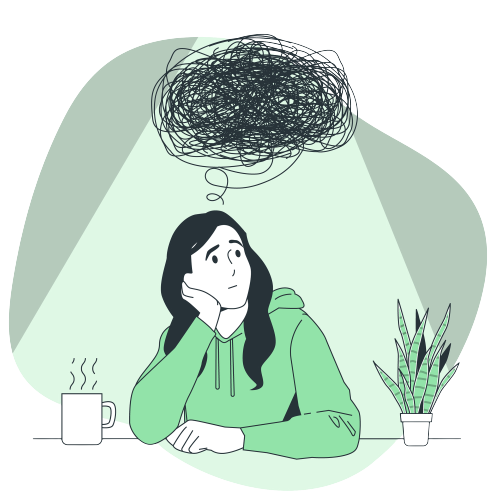Anxiety Disorders Treatment in Dubai

Overcome your Anxiety or panic attacks with the help of our experienced Psychologists in Dubai
Understanding Anxiety Disorders
Anxiety disorders are the most common of mental disorders and affect nearly 30 percent of adults at some point in their lives. But anxiety disorders are treatable and a number of effective treatments are available. Treatment helps most people lead normal productive lives. Person with an anxiety disorder has persistent or recurrent anxiety that prevents him or her from full participation in life.
Anxiety is a normal response to stress, but when it becomes overwhelming or persistent, it may develop into an anxiety disorder. At Nafsology Psychology Center in Dubai, we specialize in diagnosing and treating various forms of anxiety, ensuring personalized care for each individual. Whether you’re dealing with social anxiety, panic disorder, or generalized anxiety disorder, our experienced team is here to help you regain control of your life.
What are the signs and symptoms of Anxiety Disorders?
If you experience any of the following symptoms consistently, you may be suffering from an anxiety disorder:
- Feeling nervous, restless, or tense
- Difficulty sleeping
- Panic attacks
- Having difficulty controlling worry
- Physical symptoms, such as increased heart rate, rapid breathing, sweating, and trembling, Tightness of the chest, Muscle tension and tiredness
- Trouble concentrating or thinking about anything other than the present worry
- Having the urge to avoid things that trigger anxiety
At Nafsology Psychology Center, we understand that it can be difficult to cope with anxiety, and seeking help can be a struggle. Anxiety is treatable – get help today!
What causes Anxiety?
There are many factors that are linked to depression. These may include:
- Genetic factors – having a close family member, such as a parent or a sibling, who struggles with anxiety
- Trauma- Experiencing trauma or instability – this can reduce your ability to manage stress effectively, which can lead to you getting anxious
- Physical or mental health problems – if you already struggle with physical health conditions and or other psychiatric problems, this can make anxiety worse
- Environmental factors. such as bereavement, divorce, unemployment or financial difficulties

What are the different types of Anxiety Mental Disorders?
- Generalized Anxiety Disorder
GAD is characterized by excessive, uncontrollable worry about everyday situations. Individuals with GAD often struggle with restlessness, difficulty concentrating, and physical symptoms such as muscle tension. At Nafsology, we provide evidence-based treatments like cognitive-behavioral therapy (CBT) to help manage these symptoms effectively.
- Panic Disorder
Panic disorder involves recurrent panic attacks—sudden episodes of intense fear or discomfort. Our specialists use proven techniques, including exposure therapy and mindfulness, to reduce the frequency and severity of panic attacks, helping patients feel more in control.
During a panic attack several of these symptoms occur in combination:
- Feeling of shortness of breath or smothering sensations
- Chest pain
- Palpitations, pounding heart or rapid heart rate
- Sweating
- Trembling or shaking
- Numbness or tingling
- Chills or hot flashes
- Feeling dizzy, light-headed or faint
- Feeling of choking
- Nausea or abdominal pains
- Feeling detached
- Fear of losing control
- Fear of dying
- Social Anxiety Disorder (SAD)
A person suffering from social anxiety disorder has significant anxiety and discomfort about being embarrassed, humiliated, rejected or looked down on in social interactions. He will try to avoid the situation or endure it with great anxiety. Common examples are extreme fear of public speaking, meeting new people or eating/drinking in public. The fear or anxiety causes problems with daily functioning and lasts at least six months.
Social anxiety can prevent individuals from engaging in normal social situations due to an intense fear of judgment or embarrassment. Nafsology offers a combination of therapies, such as CBT and social skills training, to help patients overcome this fear and build confidence in social settings.
- Obsessive-Compulsive Disorder (OCD)
OCD is often marked by unwanted, intrusive thoughts (obsessions) and repetitive behaviors (compulsions). Our therapeutic approaches focus on exposure and response prevention (ERP), a highly effective treatment for reducing obsessive-compulsive behaviors.
- Post-Traumatic Stress Disorder (PTSD)
PTSD can occur after experiencing or witnessing a traumatic event. Symptoms may include flashbacks, nightmares, and severe anxiety. At Nafsology, we provide trauma-focused therapies to help patients process and overcome their traumatic experiences.
- Phobias, Specific Phobia
A specific phobia is excessive and persistent fear of a specific object, situation or activity that is generally not harmful. The person knows his fear is excessive, but he can’t overcome it. These fears cause such distress that some people go to extreme lengths to avoid what they fear. Examples are public speaking, fear of flying or fear of spiders or insects.
- Agoraphobia
Agoraphobia is the fear of being in situations where escape may be difficult or embarrassing, or help might not be available. The fear is out of proportion to the actual situation and lasts generally six months or more and causes problems in functioning. A person can only be diagnosed with agoraphobia if the fear is significantly interferes with normal daily activities orintensely upsetting.
Untreated agoraphobia can become so serious that a person may be unable to leave the house.
A person with agoraphobia experiences this fear in two or more of the following situations:
- Using public transportation
- Being in open spaces
- Being in enclosed places
- Standing in line or being in a crowd
- Being outside the home alone
The individual actively avoids the situation, requires a companion or endures with intense fear or anxiety.
- Separation Anxiety Disorder
A person with separation anxiety disorder is excessively fearful or anxious about separation from those with whom he or she is attached. This feeling is beyond what is appropriate for the person’s age, persists (at least four weeks in children and six months in adults) and causes problems functioning. He/she may be persistently worried about losing the person closest to him or her, may be reluctant or refuse to go out or sleep away from home or without that person, or may experience nightmares about separation. Physical symptoms of distress often develop in childhood, but symptoms can carry though adulthood.
Expert help for Anxiety Disorders try our Anxiety assessment from this link.
If you or a loved one are living with Anxiety, then it is important that professional support and treatment is urgently sought. Contact us at Nafsology Psychology Center today.
Book Your Consultation Today!
If anxiety is impacting your life, there’s no need to face it alone. At Nafsology Psychology Center in Dubai, we are committed to helping you overcome anxiety and live a fulfilling, peaceful life. Contact us today to schedule your consultation and take the first step toward recovery.





